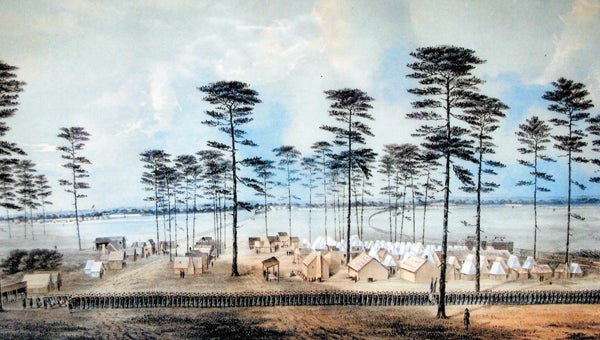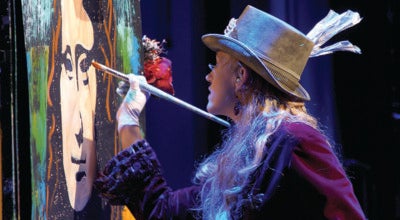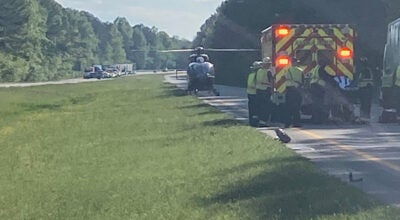Recriminations and a duel
Published 9:28 pm Friday, April 19, 2013
To mark its 150th anniversary, through May 4, the Suffolk News-Herald will feature a multi-part series by Suffolk historian Kermit Hobbs detailing the 23-day Siege of Suffolk.
Monday, April 20, 1863
Part 8: A matter of honor
By Kermit Hobbs
Special to the News-Herald
The loss of Fort Huger on April 19, 1863, was a bitter pill for the Confederates to swallow. Not only had they lost 140 men, five pieces of artillery, and a valuable piece of ground, they had suffered a tremendous blow to their dignity.
A defeat by a surprise attack in broad daylight just couldn’t happen, and yet it had.
Indeed, some years after the war, Hazard Stevens, himself, admitted that if the rear of the fort had been guarded, the attack probably would have failed. This was a prime example of those “What if…?” questions that so often pop up in the study of military history.
Naturally, somebody had to be at fault. There must be somebody to blame. The most convenient scapegoat was Gen. Samuel French, commander of the artillery for all of the Confederates around Suffolk.
The logic was that whatever good or bad happened to the artillery, it was the responsibility of the man at the top. And by the way, Gen. French was a native of New Jersey, not a true Southern-born-and-bred leader, in the opinions of most Southerners. Rightly or wrongly, the blame was laid at his feet, and he bore it for the rest of his life.
The truth was that the rear of the fort was, indeed, supposed to be guarded. The 55th North Carolina Infantry had been guarding the rear of the fort for several days and had recently requested that they be supported by two companies of the 44th Alabama.
Through missed communications, and through Gen. French’s absence due to sickness on the day of the attack, the 55th had moved too far away to support the fort, and two companies of the 44th were in the fort. But they were too few to resist the attack, and they were captured with the artillerists.
Bitter feelings erupted between the 44th Alabama and the 55th North Carolina. The Alabamians blamed the North Carolinians for not properly supporting their men when they were being attacked.
Gen. E.M. Law, brigade commander for the Alabama regiment was heard making disparaging remarks about the North Carolina Regiment. So Col. J.K. Connally of the 55th North Carolina rode over to Law’s tent and demanded an explanation. Gen. Law had no fear of Connally, but he honestly stated the comments he had heard from two of his staff officers, Capts. Terrell and Cussons.
Connally tracked down Terrell and Cussons and confronted them. Terrell stood by his criticism of the 55th. Cussons, a suave Englishman who liked nothing better than a fight, answered, “I did not say those things, but I will tell you what I now say: That if you gave your men orders to retire when the enemy appeared in their front, they obeyed d–ned promptly last night.”
“I will hold you responsible, sir, for that remark,” Connally replied. In other words, he challenged Cussons to a duel. Cussons politely accepted Connally’s challenge.
Since there were two offenders from the Alabama regiment, Cussons and Terrell, there needed to be another champion from the North Carolina regiment to face Terrell. That person would be Maj. A.H. Belo.
When the time came for the actual duel, the opponents got swapped around so that in the first round, Belo and Cussons would face each other, using Mississippi rifles at 40 yards.
On the first shot, Cussons missed altogether, and Belo shot a hole in Cussons’ hat. On the second shot, Belo missed altogether, and Cussons’ shot grazed Belo’s neck. Cussons remarked, “Major, this is d–ned poor shooting we are doing today. If we don’t do any better than this, we will never kill any Yankees!”
Just as the two gentlemen’s seconds were about to hand them the reloaded guns for the third round of shots, a messenger ran up to report that Connally and Terrell had settled their differences. There was no need to continue the duel.
Such a dramatic story deserves a more exciting ending, but there isn’t one. The existing first-hand accounts of the event each indicate that the other party had apologized for the affair. Who the “other party” was, depended on who was telling the story.
The interesting point to observe here is that in those days, matters of honor even took priority over the issues of fighting a war. This principle was accepted even by the superiors of the men involved.
Tomorrow: Part 9: Johnny Reb and Billy Yank







